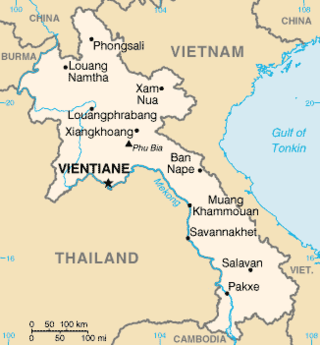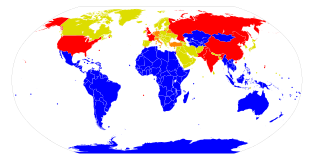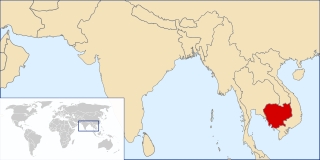
The United Nations Security Council (UNSC) is one of the six principal organs of the United Nations (UN) and is charged with ensuring international peace and security, recommending the admission of new UN members to the General Assembly, and approving any changes to the UN Charter. Its powers as outlined in the United Nations Charter include establishing peacekeeping operations, enacting international sanctions, and authorizing military action. The UNSC is the only UN body with authority to issue resolutions that are binding on member states.

A United Nations Security Council resolution (UNSCR) is a United Nations resolution adopted by the Security Council (UNSC), the United Nations (UN) 15-member body charged with "primary responsibility for the maintenance of international peace and security".

A ceasefire, also spelled cease-fire, is a stoppage of a war in which each side agrees with the other to suspend aggressive actions often due to mediation by a third party. Ceasefires may be between state actors or involve non-state actors.
The United Nations General Assembly has granted observer status to international organizations, entities, and non-member states, to enable them to participate in the work of the United Nations General Assembly, though with limitations. The General Assembly determines the privileges it will grant to each observer, beyond those laid down in a 1986 Conference on treaties between states and international organizations. Exceptionally, the European Union (EU) was in 2011 granted the right to speak in debates, to submit proposals and amendments, the right of reply, to raise points of order and to circulate documents, etc. As of May 2011, the EU is the only international organization to hold these enhanced rights, which has been likened to the rights of full membership, short of the right to vote.

The United Nations Security Council veto power is the power of the five permanent members of the UN Security Council to veto any decision other than a "procedural" decision.
Chapter VII of the United Nations Charter sets out the UN Security Council's powers to maintain peace. It allows the Council to "determine the existence of any threat to the peace, breach of the peace, or act of aggression" and to take military and nonmilitary action to "restore international peace and security".
The following outline is provided as an overview of and topical guide to the United Nations:

The 2007 United Nations Security Council election was held on 16 October 2007 during the 62nd session of the United Nations General Assembly, held at UN Headquarters in New York City. The elections were for five non-permanent seats on the UN Security Council for two-year mandates commencing on 1 January 2008.

United Nations Security Council Resolution 132, adopted on September 7, 1959, decided to appoint a sub-committee consisting of Argentina, Italy, Japan and Tunisia, and instructed it to examine statements made before the Council concerning Laos and to receive further statements and documents, and make inquiries and report to the Council as soon as possible. It was the only resolution adopted by the Security Council in 1959.
United Nations Security Council Resolution 189, adopted unanimously on June 4, 1964, deplored an incident caused by the penetration of units of the Republic of Vietnam into Cambodia and requested compensation for the Cambodians. The resolution then requested that all States and authorities recognize and respect Cambodia's neutrality and territorial integrity, deciding to send 3 of its members to the places the most recent incidents had occurred to report back to the Council in 45 days with suggestions.

The 2009 United Nations Security Council election was held on 15 October 2009 during the 64th session of the United Nations General Assembly at United Nations Headquarters in New York City. The election was for five non-permanent seats on the UN Security Council to serve two-year mandates commencing on 1 January 2010.

United Nations Security Council Resolution 1887, adopted unanimously on 24 September 2009, the Council addressed non-proliferation and the prevention of the spread of weapons of mass destruction in the world.

United Nations Security Council resolution 668, adopted unanimously on 20 September 1990, after noting the ongoing political discussions and efforts regarding a just and lasting peaceful situation in Cambodia, the council endorsed the political framework that would enable the Cambodian people to exercise their right to self-determination through U.N. organised elections.
United Nations Security Council resolution 991, adopted unanimously on 28 April 1995, after recalling all resolutions and statements on the situation in El Salvador, the Council terminated the United Nations Observer Mission in El Salvador (ONUSAL).

United Nations Security Council resolution 1329, adopted unanimously on 30 November 2000, after recalling resolutions 827 (1993) and 955 (1994), the Council enlarged the appeals chambers at both the International Criminal Tribunal for Rwanda (ICTR) and the International Criminal Tribunal for the former Yugoslavia (ICTY), proposed the election of two additional judges at the ICTR and established a pool of ad litem judges at the ICTY.

United Nations Security Council Resolution 1975, adopted unanimously on March 30, 2011, after recalling previous resolutions on the situation in Côte d'Ivoire, including resolutions 1572 (2004), 1893 (2009), 1911 (2010), 1924 (2010), 1933 (2010), 1942 (2010), 1946 (2010), 1951 (2010), 1962 (2010), 1967 (2011) and 1968 (2011), the Council demanded that Laurent Gbagbo step down as President and imposed sanctions on him and his close associates.

The United Nations Supervision Mission in Syria (UNSMIS) was a United Nations peacekeeping mission in Syria, set up in 2012 as a result of United Nations Security Council Resolution 2043 in response to the Syrian Civil War. It was commanded by Norwegian Major General Robert Mood until 20 July 2012 followed by Lieutenant General Babacar Gaye from Senegal. Although observers remain in the country, Mood suspended their mission on June 16, 2012, citing "escalating violence". Observers will conduct no further patrols and stay in their current positions until the suspension is lifted. On 20 July 2012, the Security Council extended UNSMIS for a final period of 30 days. According to resolution 2059, the Council would only consider more extensions in the event that the Secretary-General reports and the Security Council confirms the cessation of the use of heavy weapons and a reduction in the level of violence sufficient by all sides to allow UNSMIS to implement its mandate.

United Nations Security Council Resolution 2593 was adopted on 30 August 2021, following the Fall of Kabul and subsequent Taliban takeover in Afghanistan. In the resolution, the Security Council demanded that Afghan territory not be used to threaten or attack any other country or to shelter and train terrorists.
The 2026 United Nations Security Council election will be held in mid-2026 during the 80th session of the United Nations General Assembly, held at United Nations Headquarters in New York City. The elections are for five non-permanent seats on the UN Security Council for two-year mandates commencing on 1 January 2027. In accordance with the Security Council's rotation rules, whereby the ten non-permanent UNSC seats rotate among the various regional blocs into which UN member states traditionally divide themselves for voting and representation purposes, the five available seats are allocated as follows:











